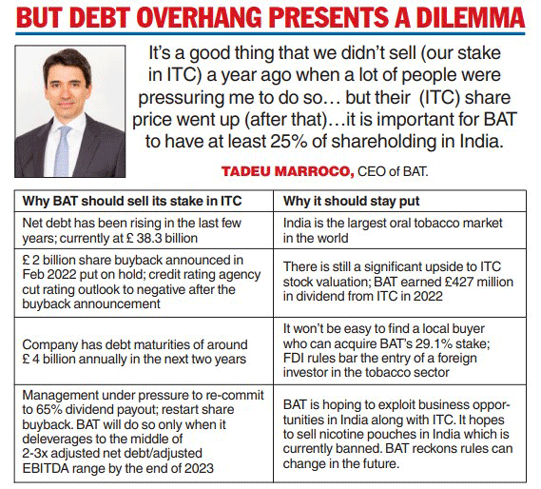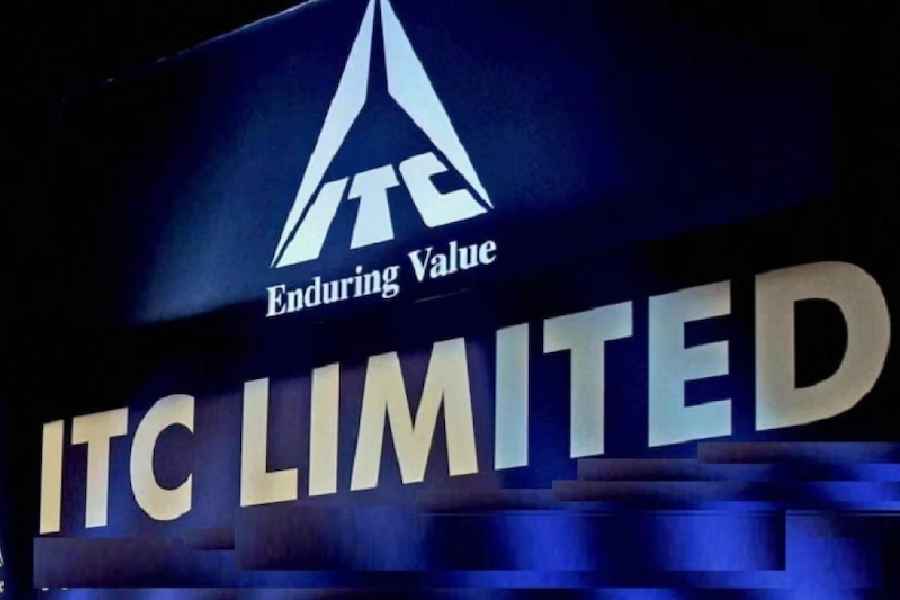Will British American Tobacco (BAT) sell a part of its 29.1 per cent stake in ITC Ltd, the cigarette-to-hotels conglomerate?
The rumour mills have started to churn with the tantalising question hanging in the air after the ITC stock soared last Monday to an all-time high of Rs 499.60, ratcheting up the value of BAT’s stake in the Calcutta-based giant to almost £ 16.8 billion (or Rs 1,77,525 crore).
The truth is BAT is caught in a dilemma: it needs a mountain of cash to pay off its massive debt which prompted it to slam the brakes on a £2 billion share buyback plan announced in February last year.
BAT had a net debt of £39.2 billion as on December 31, 2022 (£36.3 billion in 2021) which was 2.9 times to the adjusted EBIDTA. Last Tuesday, BAT announced its half-yearly results for the period ended June 30 which showed that net debt had gone down further to £38.34 billion – but still remains a daunting figure.
The tobacco giant has been focusing efforts on deleveraging its balance sheet, leaving its shareholders somewhat concerned about their returns.
At the same time, BAT cannot walk away easily from a steady stream of cash that flows into its coffers from ITC in the form of dividends and turn its back on the myriad business opportunities that it hopes to exploit through ITC in the future.
BAT earned £427 million in dividend from ITC in 2022 compared with £383 million in 2021.
In its half-year results, BAT said its share of ITC’s post-tax results had risen 21.8 per cent to £319 million from £262 million during the same period a year ago.
When The Telegraph sent in a questionnaire to BAT to seek its views on the rising global market chatter that it might be seriously considering the possibility of selling at least a part of its stake in ITC, it got no straight answers.
In one sense, the dynamics of the situation changed somewhat after ITC decided last week to demerge its hotels business in which the Calcutta-based parent will hold a 40 per cent. The announcement sent the ITC stock skidding on the stock markets as investors vented their disappointment with the plan. Top officials at Chowringhee’s Virginia House held a conference call with a bunch of analysts to defend the plan, explain how it would benefit both the parent and the demerged entity, and soothe the investors who have been flustered by the move.
Meanwhile, BAT drew our attention to a little-publicised interview that Tadeu Marroco — who took over as BAT CEO on May 15 — had with Deutsche Bank’s Gerry Gallagher at the Global Consumer Conference on June 7 where he admitted that he had been under pressure to sell its strategic stake in ITC for close to a year and had resisted it stoutly.
“It’s a good thing we didn’t sell it a year ago when a lot of people were pressuring me,” said Marroco, who was BAT’s finance and transformation director before he stepped into the corner office at London’s Globe House which serves as the headquarters of the maker of Dunhill, Kent, Pall Mall, Lucky Strike and Rothmans cigarettes.
Galloping run
The ITC share price has galloped this year, rising 40.8 per cent year to date when it closed at Rs 468.55 on Friday.
Pointing to the surge in the ITC stock and BAT’s high leverage, Gallagher bluntly prodded Marroco: “There’s a decent amount of value there (in ITC)…It will help your leverage, just do the trade.”
The BAT CEO enumerated a number of reasons why it made sense for the tobacco giant to stay put.
Marroco drew a red line for BAT: it would have to hold at least 25 per cent if it wanted to stay invested in ITC. The CEO said: “Then we can keep (our) board seats, we can veto resolutions of the company, and we can try to steer the company to (harness) opportunities” that BAT believes exist in India.
A few years ago, BAT blocked an ITC board resolution to reward its executives with stock options, fearing that this would lower its stake in the Indian conglomerate.
In its annual report last year, BAT claimed that it had suffered a deemed loss of £3 million in 2022 arising from the “deemed disposal of part of the Group’s shareholding in ITC (due to issuance of ordinary shares under the ITC Employee Share Option Scheme).”
But that isn’t the only problem that is holding BAT back from a stake sale. The bigger problem for BAT is to find a buyer.
India’s FDI regulations bar foreign investors from entering the tobacco sector. This considerably narrows the field to find a buyer for the stake and extract a decent price.
In his interview with Gallagher, Marroco succinctly summed up the issue: “So, we will have to find a local player who has all this money…
And that is not to mention the complications in terms of the RBI’s process certificates and all that. So, it’s not easy. It’s not easy.”
Moreover, it makes a great deal more sense for the ITC stock to surge as the market cottons on to the valuation upside that the cognoscenti believe that it possesses. Marocco is also betting that valuations will start brimming over soon.
The BAT CEO expounded on the logic behind this argument. “The ITC valuation has risen by about 24-25 times (in terms of earnings per share)…
It’s still a big gap compared with all the FMCGs in India which have valuations of about 40 times. So, there is a lot of potential value (that ITC can realise).”
Strategic role
The BAT CEO also outlined a strategic imperative for staying invested in ITC.
Having overtaken China to become the most populous country in the world, India is
considered as the largest oral product market for tobacco companies.
According to Marroco, India is bigger than all oral markets put together and, therefore, presents a huge opportunity.
Oral nicotine pouches, such as BAT’s Velo, which originated in Scandinavia, are one such modern oral product. They are small bags that are placed in the mouth between the upper lip and gum, which contain nicotine but no tobacco.
BAT claims that they are a modern and unobtrusive way for smokers and vapers to use nicotine. They also come in a variety of nicotine strengths and flavours to suit different tastes and preferences.
For the moment, such oral products cannot be launched in India due to the local regulation which forbids oral products above 2 milligrams of nicotine in pouches.
Marroco is hoping that India will eventually relax its rules just as the markets for vaping opened up in Peru, Columbia and Chile recently.
“This product, nicotine pouch, can have a massive positive impact on Indian society….So, we want to work with ITC on what could be a massive opportunity, (provide) a positive impact for India and also for the business. That’s the strategic relevance,” Marroco argued.
Tightrope
Market watchers believe that BAT is still walking a tightrope over here: it makes sense to stay invested in India but it can’t scorn the opportunity to cash out either. After all, one credit rating agency gave a negative outlook to its BBB+rating year soon after it announced the share buy back last year because — as Marroco claimed — they calculate the leverage differently from BAT. And that is one of the reasons why BAT halted the share buyback plan.
The latest half-yearly report of BAT says: “We are making good progress reducing our leverage towards the middle of our 2-3x adjusted net debt/adjusted EBITDA range by the end of 2023, driven by continued strong cash generation.”
The BAT Group also has to deal with debt maturities of around £4 billion annually in the next two years.
Once these issues are resolved, the company hopes to return to its commitment of making a 65 per cent dividend payout over the long term.
Meanwhile, speculation continues to swirl in the market which is eagerly waiting for the next twist in the ITCBAT saga.












